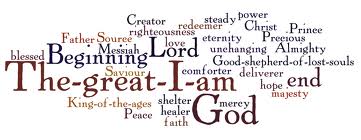
Last week we saw Jesus and his disciples at the Last Supper, sharing a Passover meal, and transforming it into a new place to understand who Jesus is. From the supper, Jesus goes with his most trusted disciples to pray and prepare for what was to come.
In the Garden, the disciples are not at their best. Jesus asks them to pray, instead they look after their own needs. He asks them to keep watch, instead they fall asleep. In the end, they do nothing to express their respect for Jesus and his teachings. When the soldiers come to arrest Jesus, they even get into a clash with them, injuring the servant of the High Priest in the process. True to his nature as a healer and man of peace, Jesus heals the servant before they take in for judgment, punishment and crucifixion.
I think there are four things this story teaches us.
1 - Just because we abandon Jesus, he never abandons us.
There are many times, large and small, when each of us deny and abandon Jesus. Like the disciples, we are afraid - of the pain we see in our future, of change, of the unknown. As Jesus is taken away, these followers scatter to places dark and unknown. Some of them peer from the shadows to see what is happening to Jesus, but many of them are not seen again until after he is dead and buried.
In the reading, Adam Hamilton writes this:
"The comfort I draw from the story is not simply that even those closest to Jesus failed him, but that Jesus knew this would happen. Following his prediction that they would fall away, Jesus looked beyond their betrayal and said, 'After I am raised up, I will go before you to Galilee' (Mark 14:28). He anticipated their desertion, but he also foretold their restoration. He would take them back despite the fact that they would not forsake him; and he is did this for them, he will do this for you and me" (page 33).
When I think of the times when I have turned away from God because of my own "stuff," I can also see in retrospect that God was with me in the midst of my struggle, supporting me in ways that I did not recognize at the time. And eventually, I begin to anticipate that God's presence and power will be there, even if I forget it in the midst of the situation.
2 - Jesus' suffering makes me understand what it means for Jesus to be fully human and fully divine.
Some people are uncomfortable with the idea that Jesus suffered as he approached the time of his death. But for many, Jesus' despair - and it's ultimate resolution - reminds me that after the pain will come joy, even if it's not the joy I was looking for.
3 - Jesus was able to forgive in the midst of betrayal.
I am certainly not so good at this, but the story in the garden does end with Peter cutting off a servant's ear, and Jesus healing him before being taken into custody. The betrayals of our lives can turn us bitter, angry, and hard. But Jesus' heart was so filled with love that he never poured out his concern and pain on others. Each time I am challenged to love others in the midst of crisis, I try to come back around to Jesus' way, sooner rather than later.
4 - When Jesus' prayer of "Not what I want, but what you want" becomes my prayer, life looks very different.
Anxiety over the future is something we all live with, some more than others. New circumstances mean that we have to trust God again to know that we will be given opportunities to live and serve, no matter where we are or what we're doing. Maybe being both a military spouses and a United Methodist minister has prepared me more that many for the idea of change after change, but that doesn't mean that it's all easy. Living a life of faith means recommitting my life to Christ each and every day. John Wesley wrote a prayer for his Covenant Service (1870) that helps me put into words that which I believe Christ needs from me.
I am no longer my own, but thine.
Put me to what thou wilt, rank me with whom thou wilt.
Put me to doing, put me to suffering.
Let me be employed by thee or laid aside for thee,
exalted for thee or brought low for thee.
Let me be full, let me be empty.
Let me have all things, let me have nothing.
I freely and heartily yield all things
to thy pleasure and disposal.
And now, O glorious and blessed God,
Father, Son, and Holy Spirit,
thou art mine, and I am thine. So be it.
And the covenant which I have made on earth,
let it be ratified in heaven. Amen.
Peace, Deb









